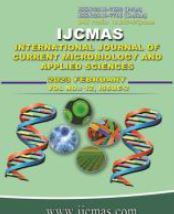


 National Academy of Agricultural Sciences (NAAS)
National Academy of Agricultural Sciences (NAAS)

|
PRINT ISSN : 2319-7692
Online ISSN : 2319-7706 Issues : 12 per year Publisher : Excellent Publishers Email : editorijcmas@gmail.com / submit@ijcmas.com Editor-in-chief: Dr.M.Prakash Index Copernicus ICV 2018: 95.39 NAAS RATING 2020: 5.38 |
Malaria is a major public health problem worldwide, especially in Africa, where antimalarial drug-resistant strains are spreading. In Côte d'Ivoire, Dihydro-artemisinine Piperaquine (DHA-PPQ) has been included in the policy for simple malaria management, but key mutations of the pfcrt gene are being studied to determine the mutation points that modulate Plasmodium falciparum resistance to Piperaquine. Genomic DNA from 158 patients from the five study sites with P.falciparum malaria was extracted using Chelex 5% tween. Conventional PCR amplification of the pfcrt gene was followed by Sanger sequencing of the amplificates on the Sanger sequencing platform of the CRCHU of Quebec (Canada). Comparison of different proportions was carried out using Rstudio software version 4.1.3. Analysis of individual alleles showed a prevalence of wild strain alleles over mutant alleles at all study sites. The K76T mutation was found at relatively low prevalences at the sites: 4.5% (1/22) in Bouaké; 10% (2/20) in Yamoussoukro; 18.5% (4/20) in Ayame; 20% (5/27) in Man and 34.8% (24/69) in Anonkoua-koute. Analysis of the distribution of the wild strain haplotype (CVMNK) of the pfcrt gene showed a high proportion (55-80% prevalence) compared to mutant strain haplotypes (1-20% prevalence). The high prevalence of the CVMNK haplotype across all sentinel sites supports the potential for regained sensitivity to CQ in the treatment of simple malaria. Therefore, continued molecular surveillance and in vitro analysis of pfcrt gene polymorphism mutations is highly recommended.
 |
 |
 |
 |
 |